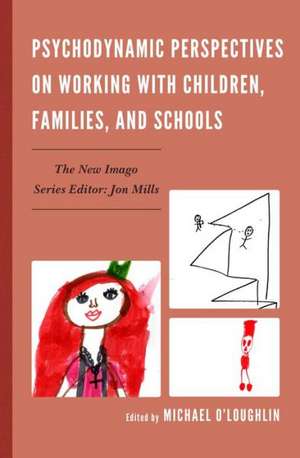Psychodynamic Perspectives on Working with Children, Families, and Schools: New Imago
en Limba Engleză Paperback – 15 iun 2014
Din seria New Imago
-
 Preț: 451.26 lei
Preț: 451.26 lei -
 Preț: 360.71 lei
Preț: 360.71 lei - 27%
 Preț: 717.65 lei
Preț: 717.65 lei - 27%
 Preț: 760.75 lei
Preț: 760.75 lei - 27%
 Preț: 721.18 lei
Preț: 721.18 lei - 23%
 Preț: 669.40 lei
Preț: 669.40 lei - 23%
 Preț: 601.35 lei
Preț: 601.35 lei - 23%
 Preț: 702.15 lei
Preț: 702.15 lei - 27%
 Preț: 670.34 lei
Preț: 670.34 lei - 27%
 Preț: 687.21 lei
Preț: 687.21 lei - 23%
 Preț: 665.08 lei
Preț: 665.08 lei - 27%
 Preț: 841.42 lei
Preț: 841.42 lei -
 Preț: 533.05 lei
Preț: 533.05 lei - 27%
 Preț: 771.51 lei
Preț: 771.51 lei -
 Preț: 393.07 lei
Preț: 393.07 lei -
 Preț: 269.04 lei
Preț: 269.04 lei
Preț: 447.23 lei
Preț vechi: 580.82 lei
-23% Nou
Puncte Express: 671
Preț estimativ în valută:
85.58€ • 89.60$ • 70.98£
85.58€ • 89.60$ • 70.98£
Carte tipărită la comandă
Livrare economică 10-24 aprilie
Preluare comenzi: 021 569.72.76
Specificații
ISBN-13: 9781442238176
ISBN-10: 1442238178
Pagini: 335
Dimensiuni: 152 x 226 x 28 mm
Greutate: 0.52 kg
Editura: Rowman & Littlefield
Seria New Imago
ISBN-10: 1442238178
Pagini: 335
Dimensiuni: 152 x 226 x 28 mm
Greutate: 0.52 kg
Editura: Rowman & Littlefield
Seria New Imago
Notă biografică
Cuprins
Acknowledgments
Foreword, Daniel B. Frank
Introduction, Michael O¿Loughlin
Chapter 1: Interdisciplinary Psychoanalysis and the Education of Children, Jonathan Cohen
Chapter 2: The Child, Childhood, and School, Patrick Lewis
Chapter 3: Subjection and Subjectivity: The Child and A Mind of One¿s Own, Karen Lombardi
Chapter 4: Françoise Dolto: Someone to Watch over Me, Derek Bunyard
Chapter 5: Ghostly presences in children¿s lives, Michael O¿Loughlin
Chapter 6: The Family Unconscious, Karen Lupe
Chapter 7: Working at the Interface of Education and Trauma in an Indigenous Pre-school: The Importance of ¿Deep Soul Listening¿, Norma Tracey
Chapter 8: Self-Containment Versus Fragmentation: Helping Parents Understand Their Child¿s Language of Play, Donna Wolf-Palacio
Chapter 9: The Hidden Allies: Parents as Collaborators, Carola Chase
Chapter 10: Even when things go well they are difficult: A Psychoanalytic Approach to the Relationship between School and Family, Ana Archangelo & Fabio Camargo Bandeira Villela
Chapter 11: Integrative Role of Psychodynamic Principles in an Interdisciplinary Elementary School, Leon Hoffman, Carol Catapano, Katy Meyer
Chapter 12: Reviving Schools as `Great Good Places¿, Robbie Lloyd
Chapter 13: Not Confronting the Resistances in a Psychoanalytically Guided School, Howard Covitz
Chapter 14: Psychoanalytic understandings of classroom life and learning, Devin Thornburg
Chapter 15: A vision of the Psychodynamically Informed School (PIS), Al Galves
Chapter 16: Progressive Education and Psychoanalysis: Toward a Theory of the
Subjective Experience of School Life, Daniel B. Frank
Index
About the Contributors
Descriere
For school professionals seeking to work in emotionally focused ways with children, this book offers a wide range of essays illustrating how psychodynamic ideas can be used to validate children, respect the contexts of their communities, and create nonauthoritarian classrooms in which such children might develop to their fullest potential.
